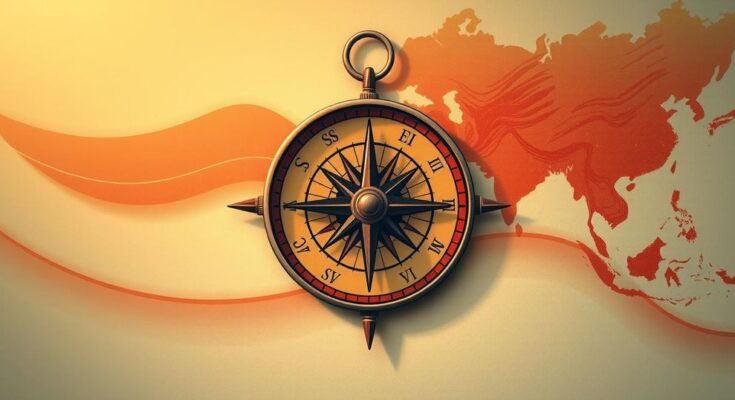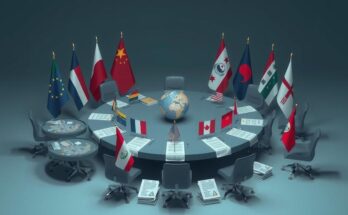Elliott Abrams’ article on West Asia simplifies the complexities of Iran’s regional influence, labeling its alliances as proxy warfare without recognizing local motivations. The historical context of foreign interventions, power imbalances, and nuclear dynamics are crucial to understanding ongoing conflicts. The need for diplomatic engagement with Iran rather than confrontation is essential for future stability in the region, rejecting outdated Cold War paradigms in favor of a multipolar approach.
The West Asian region is experiencing significant geopolitical transformations that may disrupt established power hierarchies and lead to the emergence of new alliances. Elliott Abrams, in his article “A Paradigm Shift for the Middle East,” advocates for a U.S.-Israeli strategy to counter Iran’s expanding influence, particularly concerning its nuclear objectives and affiliations with Resistance groups. However, his analysis oversimplifies the intricacies of these relations and ignores the historical context of West Asia’s quest for sovereignty.
Abrams characterizes Iran’s connections with groups such as Hezbollah and Hamas as mere expressions of “proxy warfare,” which diminishes the underlying motivations of these organizations. These groups originated as local responses to foreign occupation and external disturbances, striving for national sovereignty. For instance, Hezbollah was established in response to Israel’s occupation of southern Lebanon, while Hamas arose as a resistance against Israeli occupation in Palestine – both embodying a broader endeavor for justice and autonomy.
A critical shortcoming of Abrams’ assessment is his neglect of the impact that foreign interventions have had on regional instability. U.S. military interventions in nations such as Iraq, Afghanistan, and Syria have undermined national sovereignty, fostering resentment among local populations. While Abrams appreciates Israeli military actions against groups like Hezbollah and Hamas, he overlooks the significant power disparity that skews the conflict, resulting in substantial civilian casualties and devastation, particularly in Gaza and Lebanon.
Rather than being a catalyst for peace, Israel’s military approach exacerbates regional volatility and perpetuates cycles of violence. Continuing with the expansion of settlements in the West Bank and maintaining the Gaza blockade are noteworthy factors driving ongoing conflicts. Disregarding the historical experiences of Israeli aggression and international law violations, Abrams’ endorsement of Israeli military strategies fails to acknowledge the broader humanitarian impact, particularly amidst the current crisis in Gaza.
A significant contention in Abrams’ piece is his assertion regarding the increasing threat posed by Iran’s nuclear program; however, this position is based on exaggerations. Iran remains committed to the Non-Proliferation Treaty (NPT) and collaborates with the International Atomic Energy Agency (IAEA). Despite the development of its nuclear capabilities in response to the U.S. withdrawal from the JCPOA, there lacks substantial evidence to suggest that Iran is pursuing nuclear weapons, as it was not Iran that rendered the JCPOA ineffective.
Conversely, Israel, a vocal critic of Iran, maintains an undisclosed nuclear arsenal and has refrained from signing the NPT. This inconsistency raises concerns about the credibility of Western criticisms of Iran while neglecting Israel’s nuclear capabilities. If the proliferation of nuclear weapons is genuinely a priority, one must question the lack of attention on Israel’s status amid heightened scrutiny of Iran’s peaceful nuclear endeavors.
Abrams’ commentary fails to recognize Iran’s essential role in the emerging landscape of West Asia, as U.S. and Israeli preeminence wanes in favor of a multipolar world. Iran, alongside other global and regional entities, is instrumental in this shift. The rising influence of BRICS nations, declining U.S. dominance, and the perseverance of the Axis of Resistance reinforce a changing balance of power in the region.
Moreover, as Abrams has acknowledged, Iran’s developing partnerships with countries like China and Russia are reshaping its position and diminishing U.S. authority. This dynamic contributes to the portrayal of Iran as a “threat,” likely reflecting Western anxiety about the evolution in global power relations. For a more stable future, the U.S. and allies should engage Iran as a vital regional player through diplomatic efforts rather than rely on antiquated policies of aggression and pressure.
In conclusion, if figures like Abrams seek genuine stability in West Asia, it is imperative to abandon outdated Cold War paradigms and embrace the necessity for a more equitable and multipolar approach. Recognizing Iran’s significance in regional affairs and opting for diplomacy instead of confrontation may pave the way for a more stable and just future in West Asia.
The ongoing geopolitical shifts in West Asia are pivotal in determining future alliances and power dynamics. As traditional power structures come under pressure due to various factors, including the decline of U.S. dominance and the emergence of new partnerships among regional and global actors, there is a call for a reevaluation of strategies regarding influential players such as Iran. The complexities of these relationships require an understanding that transcends simplistic narratives of proxy wars and threats.
The analysis underscores the need for a nuanced understanding of Iran’s role as a regional actor in a shifting geopolitical landscape. It advocates for a transition from confrontational policies to diplomacy in order to address the roots of conflict in West Asia. In moving towards a multipolar world, engaging with Iran meaningfully could foster greater stability and mutual respect among nations in the region.
Original Source: www.tehrantimes.com




